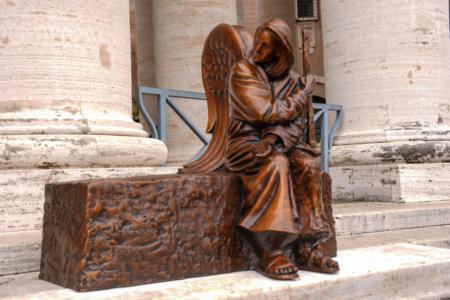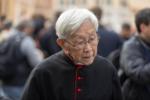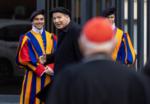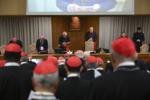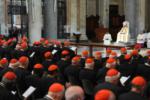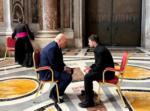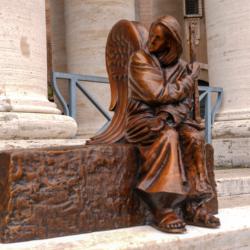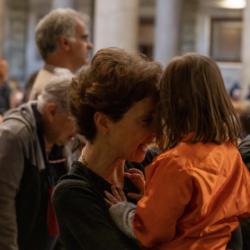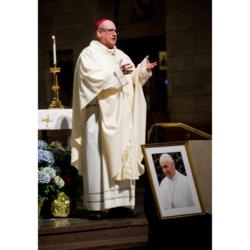Boston officials express concerns over parish, school closures
A hearing called by the Boston City Council on the possible ramifications of Catholic school and parish closings went ahead as scheduled, despite the Archdiocese of Boston’s decision not to send a representative.
The March 9 hearing was held jointly by two of the city council committees, education and planning and economic development.
"Please know that representatives of the archdiocese have and will continue to meet with elected officials of all cities and towns who may be affected by the process of reconfiguration in order to keep open the lines of communication," wrote Father Christopher J. Coyne, the cabinet secretary for public relations in a letter to City Council President Michael F. Flaherty.
The letter, which arrived by fax before the start of the meeting, was accompanied by a formal statement from the archdiocese. The statement stressed that the reconfiguration process has not yet produced answers to any of the questions that would have been asked at the hearing. Further, the statement said the impact of reconfiguration on the school children would be minimal. “No child will be deprived of a Catholic school education because of a lack of space.”
Councilor James M. Kelly read the letter and statement in full as he opened the hearing, and copies were circulated throughout the chamber gallery.
In his testimony, William F. Galvin, the Secretary of the Commonwealth of Massachusetts, called for a one-year moratorium on any church or school closings. “One year is a short time, but it is a long time for a student left adrift.”
"[Otherwise] children will be victimized as we have seen in the past," he said.
Galvin also sharply criticized the Boston archdiocese for its failure to coordinate and communicate with Boston city officials.
Galvin compared the archdiocese to a man who, after being convicted of killing both of his parents, asked the judge for mercy because he is an orphan.
The Church has real problems, such as a reduction in clergy and falling attendance, but those problems are a direct result of the Church’s own behavior, he said. “Shame on them! They have learned nothing from their recent experiences.”
Galvin said as the head of the state’s historical commission he was concerned about the disposition of churches and buildings and he is skeptical of the archdiocese’s estimates for the annual building maintenance. “The estimates given have been the maximum, and in many cases is not an accurate picture.”
In Europe, beautiful and magnificent churches are preserved long after their congregations have gone away, he said.
When Galvin had finished his testimony, City Councilor James M. Kelly, the chairman of the planning and economic development committee said that although it was against council rules he wanted to lead a round of applause for the secretary and his comments.
Following Galvin, State Sen. Jack Hart, D-South Boston, testified that he was very disappointed the archdiocese failed to send a representative. “Ninety percent of the problems in this world are caused by a lack of communications.”
Hart said that by defying the request to speak before the city council, the archdiocese was losing an opportunity to avoid the kind of trauma families experienced when the St. Augustine School in South Boston was closed at the end of the school year in 2003. “The students were given notes to take home in their book bags.”
“[The Church] is the largest land owner in the city and they have a responsibility to be in communication with the city and its elected officials,” he said.
Also testifying were Mark Maloney, head of the Boston Redevelopment Authority, and Michael Contompasis, the chief operating officer for the city’s public schools system.
At the close of the hearing, City Councilor Jerry P. McDermott said that the council should use its power of subpoena in order to compel the archdiocese to send a representative.
The invitation to the archdiocese was sent March 3 by mail and was followed up by daily phone calls, said E. Joseph O’Keefe, Flaherty’s policy director.
Prior to the hearing, sensing the archdiocese would decline to attend, O’Keefe requested that D. Paul Koch, Jr., a staff lawyer for the city, research the question of the council’s subpoena powers, O’Keefe said.
State law grants the council wide powers to summon witnesses, and failure to attend and testify would be handled by the courts. This is seen only as a last resort, as the city council would work with the archdiocese in any way to facilitate a dialogue, he said.
Although he did not attend the hearing, Boston Mayor Thomas M. Menino, said that he was very concerned about the archdiocese’s reconfiguration. “The churches are beacons of hope in the city’s communities.”
"There has been too much unknown, hearsay and lack of facts about what the effects will be," he said.
He would not support a one-year moratorium on school and church closing, because it would just delay the issue. Instead, the archdiocese should develop a three-year plan to be completed in phases, Menino said.
The mayor said he had known for over a week that officials from the archdiocese were not going to attend the hearing through his own communications with Church officials.
